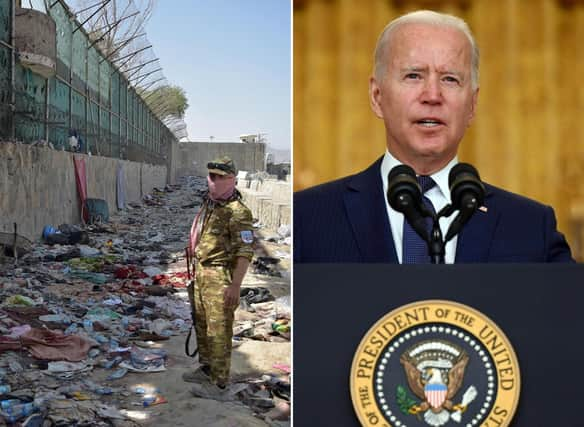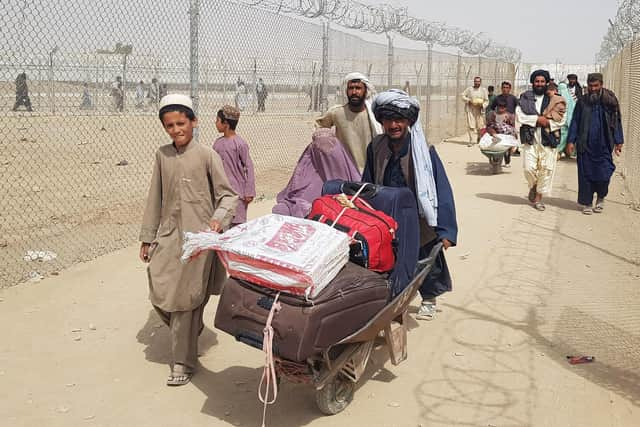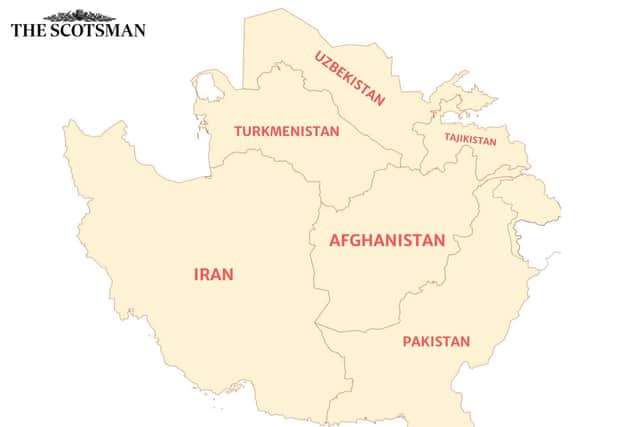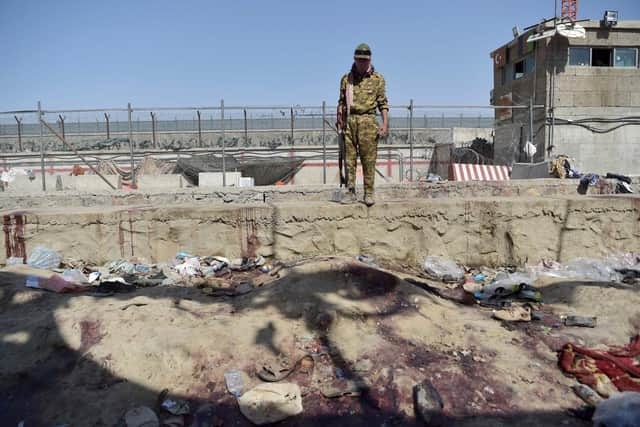Who are the Taliban? What is happening in Afghanistan? What did Joe Biden say after Kabul airport attacks?


20 years after Western allied forces first entered Afghanistan to remove the Taliban, the terrorist group has led a sudden charge to reclaim the Afghan capital of Kabul and the country’s government.
British troops are now racing against the clock to get remaining UK nationals and their local allies out of Afghanistan following the dramatic fall of the country's Western-backed government to the Taliban.
Advertisement
Hide AdAdvertisement
Hide AdWhile Taliban fighters have stressed that “war is over” and that the party no longer seeks to wage terror over the population, citizens and worldwide governments alike fear the group will return to brutal terror tactics to remain in power.
The group’s return to the heart of the Afghan state in Kabul came after President Ashraf Ghani fled the country on Wednesday 11 August.
As citizens rushed to Kabul Airport alongside British nationals, including interpreters and civil servants, to try and board commercial flights, two terror attacks took place at the airport on Thursday – killing at least 90 people and wounding more than 150.
13 US service personnel were among those killed in the blasts, in the deadliest day for US forces in Afghanistan since August 2011.
With commercial flights from Kabul grounded on 16 August as Afghans tried to flee the country, Western governments are continuing to hold evacuation flights as the US still looks to meet its deadline of full withdrawal from the country by 31 August.


Here’s what you need to know about the Taliban, Afghanistan and comments from UK politicians as events unfold.
Who are the Taliban?
With ‘Taliban’ meaning ‘students’ in Afghanistan’s native language of Pashto, the Taliban is an extremist group abiding by a strict interpretation of Islam and its traditional Sharia religious law.
The group originated from US-backed extremist group, the mujahideen, who successfully repelled communist Soviet Union forces occupying Afghanistan until 28 April 1992.


Advertisement
Hide AdAdvertisement
Hide AdThe Taliban then rose to power in the country, claiming it in 1996 as their territory and an Islamic state which would see an extremist interpretation of Sharia law imposed on the country’s citizens.
This included fierce physical punishment for crimes against the state such as public executions and strict limits on Afghan women’s freedom, movements and activities.
Since US and UK forces fought to replace the regime with a Western-backed alternative government in the early 2000s, the group has been less concentrated in Afghanistan – but has spent the last two decades attempting to fight against this government and shore up support with citizens across the country.
With former Taliban founder Mullah Mohammad Omar dying in 2013, the group is now led by Mawlawi Haibatullah Akhundzada, a legal scholar who is the Taliban’s supreme authority on the group’s activities.


What’s happening in Afghanistan?
Intense fighting between the Taliban and Western-backed Afghan forces broke out in May, when NATO stepped up its efforts to withdraw troops from the country.
After US forces missed a deadline previously agreed on by former president Donald Trump for the removal of troops from Afghanistan by 1 May, fighting broke out between US troops and Taliban fighters in the Helmand province.
President Biden instead said that all US troops would be removed from the country by the 20-year anniversary of 9/11 on 11 September this year.
The last three months have seen Taliban fighters reclaim areas of Afghanistan, including districts such as southeastern Ghazni and southern Kandahar.
Advertisement
Hide AdAdvertisement
Hide AdTaliban efforts have accelerated this month, with the group launching an attack targeting prominent Kabul lawmakers, killing eight people, and later killing a government media representative in early August.
Triumphal fighters were pictured in the presidential palace abandoned by President Ashraf Ghani who fled the country while his forces gave up the city without a fight.
Following a meeting of the Government's Cobra emergencies committee, Boris Johnson said his priority was to get UK nationals and Afghans who had worked with them out of the country "as fast as we can".
After the twin terror attacks at Kabul Airport on Thursday 26 August, UK Defence Secretary Ben Wallace told Sky News that the UK was entering its final stages of evacuations.
"We at 4.30 this morning, UK-time, closed the Baron's hotel, shut the processing centre and the gates were closed at Abbey Gate,” Mr Wallace said.
"We will process the people that we've brought with us, the 1,000 people approximately in the airfield now and we will seek a way to continue to find a few people in the crowds where we can, but overall the main processing is now closed and we have a matter of hours."
Wallace added: "The sad fact is not every single one will get out."
Where is Afghanistan?
Afghanistan is a large country based in Central Asia that shares its western border with Iran but borders with Pakistan to the east and south.
Advertisement
Hide AdAdvertisement
Hide AdThe country, also bordering Turkmenistan, Tajikistan and Uzbekistan, has a population of more than 38 million people.
It is a mountainous and rocky country, with Afghanistan’s Noshaq mountain being the country’s highest peak at 24,580 feet.
As well as being covered in lots of dry deserts, the country is a rich source of expensive minerals and metals.
Having been described as the ‘Saudi Arabia of Lithium’ – the high in demand metal used for energy efficient batteries in electric cars - Afghanistan’s natural mineral reserves have been valued at over $1 trillion.
What did Joe Biden say after Kabul airport attacks?
In a briefing held yesterday, President Biden said that US intelligence operatives had identified the two bombings at Hamid Karzai International Airport as being carried out by a terrorist group called Isis-K.
President Biden said: “The intelligence community has assessed has [was] undertaken — an attack — by a group known as Isis-K — took the lives of American service members standing guard at the airport, and wounded several others seriously.
"They also wounded a number of civilians, and civilians were killed as well.”
The group known as Isis-K are regarded as an “arch-enemy” of the Taliban, the President added.
Advertisement
Hide AdAdvertisement
Hide AdHe went on to vow revenge on those who had launched the attacks which killed a number of US service personnel and Afghan civilians, saying that US forces would “hunt [them] down and make [them] pay”.
President Biden added: "To those who carried out this attack, as well as anyone who wishes America harm, know this: We will not forgive. We will not forget. We will hunt you down and make you pay.
"I will defend our interests and our people with every measure at my command.”
First Minister Nicola Sturgeon described the events as “dreadful attacks”, adding on Twitter that “we owe such a debt to our armed forces and others working against the clock to evacuate as many people as possible from this grim situation”.
Prime Minister Boris Johnson has since been urged by former UK military commander General Sir Richard Barrons that the threat posed by Isis in the country showed the need to form a relationship with the Taliban, “since we no longer have an embassy, troops on the ground, or a relationship with the Afghan security forces.”
Additional reporting by the Press Association and PA Whitehall Editor Gavin Cordon
A message from the Editor: Thank you for reading this article. We're more reliant on your support than ever as the shift in consumer habits brought about by coronavirus impacts our advertisers.
If you haven't already, please consider supporting our trusted, fact-checked journalism by taking out a digital subscription.
Comments
Want to join the conversation? Please or to comment on this article.
